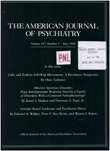Conceptual and methodological issues in comparative studies of psychotherapy and pharmacotherapy, II: Nature and timing of treatment effects
Abstract
This is the second of two articles on the conceptual and methodological problems involved in comparing the effectiveness of drugs and psychotherapy in the treatment of mental disorders. Part II focuses on differences between psychotherapy and pharmacotherapy in the nature of treatment effects and related goals for treatment, differences in the time course of treatment effects, and potential sources of bias in the research setting. In designing comparative studies of psychotherapy and pharmacotherapy, investigators should address methodological choices explicitly and consider the implications for interpretation of findings.
Access content
To read the fulltext, please use one of the options below to sign in or purchase access.- Personal login
- Institutional Login
- Sign in via OpenAthens
- Register for access
-
Please login/register if you wish to pair your device and check access availability.
Not a subscriber?
PsychiatryOnline subscription options offer access to the DSM-5 library, books, journals, CME, and patient resources. This all-in-one virtual library provides psychiatrists and mental health professionals with key resources for diagnosis, treatment, research, and professional development.
Need more help? PsychiatryOnline Customer Service may be reached by emailing [email protected] or by calling 800-368-5777 (in the U.S.) or 703-907-7322 (outside the U.S.).



